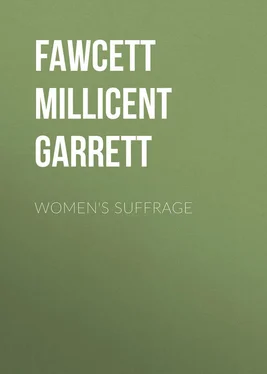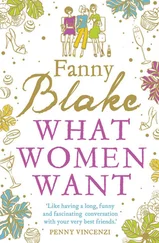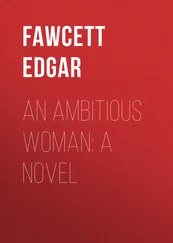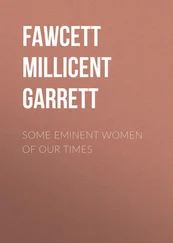Millicent Fawcett - Women's Suffrage
Здесь есть возможность читать онлайн «Millicent Fawcett - Women's Suffrage» — ознакомительный отрывок электронной книги совершенно бесплатно, а после прочтения отрывка купить полную версию. В некоторых случаях можно слушать аудио, скачать через торрент в формате fb2 и присутствует краткое содержание. Издательство: Иностранный паблик, Жанр: foreign_antique, foreign_prose, на английском языке. Описание произведения, (предисловие) а так же отзывы посетителей доступны на портале библиотеки ЛибКат.
- Название:Women's Suffrage
- Автор:
- Издательство:Иностранный паблик
- Жанр:
- Год:неизвестен
- ISBN:нет данных
- Рейтинг книги:3 / 5. Голосов: 1
-
Избранное:Добавить в избранное
- Отзывы:
-
Ваша оценка:
- 60
- 1
- 2
- 3
- 4
- 5
Women's Suffrage: краткое содержание, описание и аннотация
Предлагаем к чтению аннотацию, описание, краткое содержание или предисловие (зависит от того, что написал сам автор книги «Women's Suffrage»). Если вы не нашли необходимую информацию о книге — напишите в комментариях, мы постараемся отыскать её.
Women's Suffrage — читать онлайн ознакомительный отрывок
Ниже представлен текст книги, разбитый по страницам. Система сохранения места последней прочитанной страницы, позволяет с удобством читать онлайн бесплатно книгу «Women's Suffrage», без необходимости каждый раз заново искать на чём Вы остановились. Поставьте закладку, и сможете в любой момент перейти на страницу, на которой закончили чтение.
Интервал:
Закладка:
The connection between the election of the ladies just mentioned – and other instances might be added – with the suffrage movement is strongly indicated by the fact that they were, without exception, the leading personal representatives of the suffrage movement in the various places in which they respectively lived. Miss Garrett and Miss Davies, as just described, helped to organise the suffrage petition, which they handed to Mr. Mill in 1866; Miss Becker was the head and front of the suffrage movement in Manchester, and Miss Flora Stevenson in Edinburgh. These ladies had taken an active part in starting the women's suffrage societies in their own towns. Five important societies came into existence almost simultaneously in London, Manchester, Edinburgh, Bristol, and Birmingham, and as they almost immediately devised a plan for combining individual responsibility with united action, they formed the nucleus of the National Union of Women's Suffrage Societies, which has become the largest organisation of the kind in the United Kingdom, and in October 1911 numbered 305 societies, a number which is constantly and rapidly increasing.
With the suffrage work carried on by the societies, other work for improving the legal status of women, resisting encroachments upon their constitutional liberties, and improving their means of education went on with vigour, sobriety, and enthusiasm; these qualities were combined in a remarkable degree, and were beyond all praise. It has been remarked that the successful conduct of every great change needs the combination of the spirit of order with the spirit of audacity. It was the good fortune of the women's movement in England to secure both these. The suffrage societies from the first saw the necessity of keeping to suffrage work only; but the same individuals in a different capacity were labouring with heroic persistence and untiring zeal to lift up the conditions of women's lives in other ways; thus to Mrs. Jacob Bright, Mrs. Wolstenholme Elmy, Mrs. Duncan M'Laren, and Mrs. Pochin, we owe the first Married Women's Property Act, and also the Guardianship of Children Act; to Mrs. Bodichon and Miss Davies, Henry Sidgwick and Russell Gurney, the opening of university education to women; to Miss Garrett (now Mrs. Anderson), Dr. Elizabeth Blackwell, and Miss Jex Blake, the opening of the medical profession; to Mrs. Josephine Butler, and Mr. and Mrs. Sheldon Amos, Sir James Stanfeld, and Mr. James Stuart, the repeal of the Contagious Diseases Acts (passed in 1866 and 1868); to Mrs. William Grey, Miss Sherriff and Miss Gurney, the creation of good secondary schools for girls. I am well aware that in this bald recital I have omitted the names of many noble, conscientious, and self-sacrificing workers for the great causes to which they had devoted themselves; I cannot even attempt to make my list exhaustive; I have but selected from a very large number, all ardent suffragists, a few names that stand out preeminently in my memory among the glorious company whose efforts laid the foundations on which we at the present day are still building the superstructure of equal opportunity and equal justice for women and men.
As an illustration of how the tone has changed in regard to the personal and proprietary rights of women I can give a little story which fell within my own experience. In the 'seventies I was staying with my father at a time when he had convened in his house a meeting of Liberal electors of East Suffolk. We were working then for a Married Women's Property Bill. The first Act passed in 1870 gave a married woman the right to possess her earnings , but not any other property. I had petition forms with me, and thought the "Liberal" meeting would afford me a good opportunity of getting signatures to it. So I took it round and explained its aim to the quite average specimens of the Liberal British farmer. "Am I to understand you, ma'am, that if this Bill passes, and my wife have a matter of a hundred pound left to her, I should have to ask her for it?" said one of them. The idea appeared monstrous that a man could not take his wife's £100 without even going through the form of asking her for it.
But we were making way steadily. It is true that Mr. Mill was not re-elected in 1868, but Mr. Jacob Bright succeeded him as the leader in the House of Commons of the women's suffrage movement. The second reading of his, the first Women's Suffrage Bill, was carried on May 4, 1870, by 124 to 91. Further progress was, however, prevented, mainly in consequence of the opposition of the Government, and on the motion to go into committee on May 12, the Bill was defeated by 220 to 94.
From the beginning women's suffrage had never been a party question. In the first division, that on Mr. Mill's Amendment to the Reform Bill, the 73 members who voted for women's suffrage included about 1 °Conservatives, and one of them, the Rt. Hon. Russell Gurney, Q.C., Recorder of London, was one of the tellers in the division. The great bulk of the supporters of the principle of women's suffrage were then and still are Liberals and Radicals, but from the outset we have always had an influential group of Conservative supporters. And it is indicative of the general growth of the movement that among the large majority secured for the second reading of Sir George Kemp's Bill in May 5, 1911, 79 were Conservatives, a number in excess of the total of those who supported Mr. Mill's amendment in 1867. Sir Stafford Northcote (afterwards Lord Iddesleigh) was among the friends of women's suffrage, and so was Sir Algernon Borthwick (afterwards Lord Glenesk), the proprietor and editor of The Morning Post . Support from the Conservative side of the house was greatly encouraged in 1873 by a letter written by Mr. Disraeli in reply to a memorial signed by over 11,000 women. The memorial had been forwarded by Mr. William Gore Langton, M.P., and was thus acknowledged: —
"Dear Gore Langton, – I was much honoured by receiving from your hands the memorial signed by 11,000 women of England – among them some illustrious names – thanking me for my services in attempting to abolish the anomaly that the Parliamentary franchise attached to a household or property qualification, when possessed by a woman, should not be exercised, though in all matters of local government when similarly qualified she exercises this right. As I believe this anomaly to be injurious to the best interests of the country, I trust to see it removed by the wisdom of Parliament. – Yours sincerely,
"B. Disraeli."This was written in 1873 in immediate prospect of the dissolution of Parliament, which took place in February 1874, and placed Mr. Disraeli in power for the first time.
These were days of active propaganda for all the suffrage societies. A hundred meetings were held on the first six months of 1873, a large number for that time, though it would be considered nothing now. All the experienced political men who supported women's suffrage told us that when the 1874 Parliament came to an end a change of Government was highly probable, a new Liberal Government would be in power, and would certainly deal with the question of representation – that then would be the great opportunity, the psychological moment, for the enfranchisement of women. The agricultural labourers were about to be enfranchised and the claim of women to share in the benefits of representative government was at least as good, and would certainly be listened to. With these hopes we approached the election of 1880.
CHAPTER III
THROWING THE WOMEN OVERBOARD IN 1884
"We have filled the well-fed with good things, and the hungry we have sent empty away." – From the Politician's Magnificat .
The year 1880 opened cheerfully for suffragists. There was a series of great demonstrations of women only, beginning with one in the Free Trade Hall, Manchester, in February. The first little bit of practical success too within the United Kingdom came this year, for suffrage was extended to women in the Isle of Man. At first it was given only to women freeholders, but after a few years' experience of its entirely successful operation all feeling of opposition to it died away, and it was extended to women householders. The representative system of the Isle of Man is one of the oldest in the world, and the House of Keys is of even greater antiquity than the House of Commons.
Читать дальшеИнтервал:
Закладка:
Похожие книги на «Women's Suffrage»
Представляем Вашему вниманию похожие книги на «Women's Suffrage» списком для выбора. Мы отобрали схожую по названию и смыслу литературу в надежде предоставить читателям больше вариантов отыскать новые, интересные, ещё непрочитанные произведения.
Обсуждение, отзывы о книге «Women's Suffrage» и просто собственные мнения читателей. Оставьте ваши комментарии, напишите, что Вы думаете о произведении, его смысле или главных героях. Укажите что конкретно понравилось, а что нет, и почему Вы так считаете.












